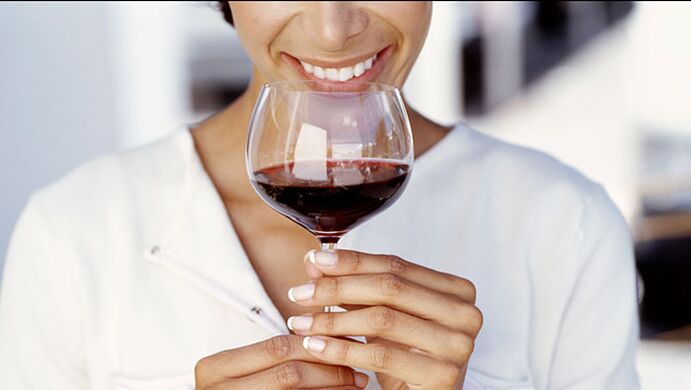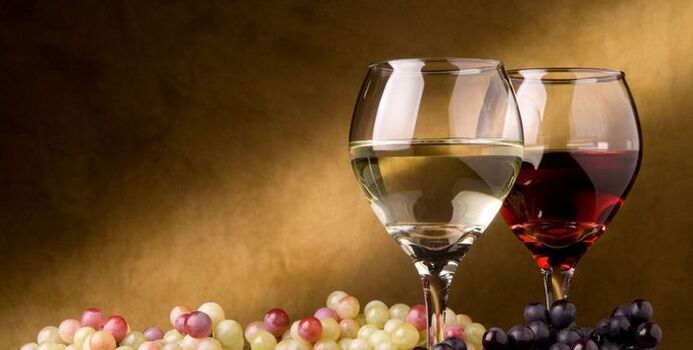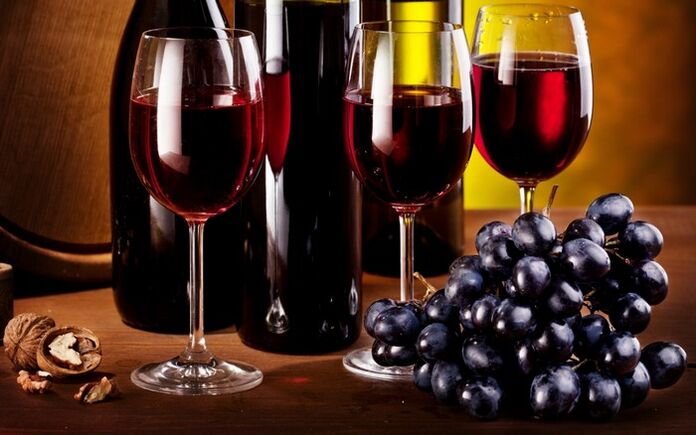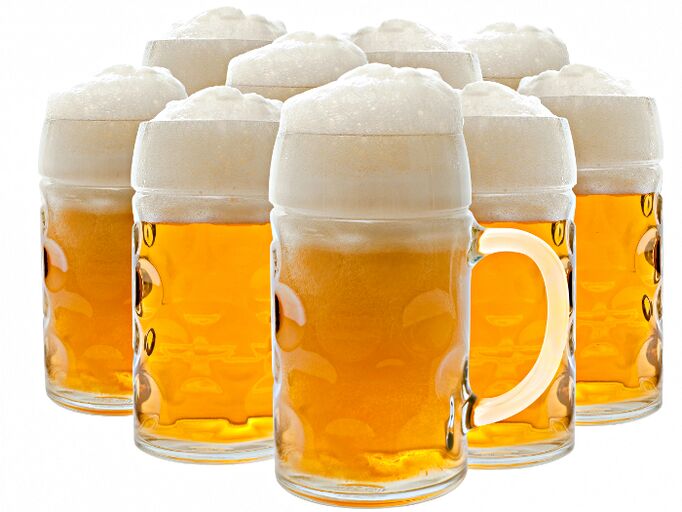A person who is forced to follow a diet for one reason or another should consider the possibility of combining it with a diet before drinking alcohol. Strong alcohol with diet can only harm the body and prevent you from losing weight, as many alcoholic beverages high in ethanol are high in calories. But that doesn't mean you shouldn't drink alcohol while on a diet. Some drinks can be combined in moderation with your diet.
Properties of alcoholic beverages

Quite often when losing weight we consider only the number of calories in the food on the table, but we do not take into account ordinary and alcoholic beverages. Some go to the other extreme, believing that alcohol can only put you on a diet, not allowing you to control the amount of food and therefore not drinking at all.
However, not all of us know that during the diet some alcoholic beverages (low in calories), on the contrary, are useful because they help improve digestion, speed up metabolic processes, which will create favorable conditions for weight loss. In this case, you need to know exactly what alcohol can be consumed during the diet, as well as whether it is possible to drink strong alcohol in the diet.
To find out what alcohol you can drink during a diet, you need to study the characteristics of its effect on the body. So, it is worth noting that every alcoholic beverage contains ethanol. It is quite a high-calorie substance that is well absorbed by our body. There is the following classification of alcohol:
- non-distilled alcoholic beverages such as wine and beer;
- refined, ie distilled beverages, namely vodka, whiskey, alcohol.
Alcohol will contribute to the appearance of overweight in such cases:
- If you drink during a holiday, then you will inevitably have to eat, and because alcohol increases your appetite, you can eat much more than your diet provides.
- Strong alcoholic beverages are high in calories. That is, if you drink vodka, cognac, whiskey and other strong alcoholic beverages, then you can begin to recover, which during the diet will nullify all your efforts.
- Alcoholic beverages that contain a lot of sugar, yeast or other nutrients (cream, milk, eggs, various flavors) should not be consumed during the diet, as they contribute to rapid weight gain. It is best to drink alcohol with a minimum of carbohydrates.
- Even if you do not take into account how much alcohol we drink, it is worth remembering that ethyl alcohol slows down the process of fat processing. As a result, you may not gain weight, but you will not be able to lose weight on such a diet.
- In addition, by regularly consuming even soft drinks, you contribute to the disruption of metabolic processes in the body. This leads to the development of alcoholism and weight gain.
Alcoholic beverages are allowed during the diet

Now let's find out what you can drink with a diet? If we evaluate all alcoholic beverages in terms of calorie content, then the highest calorie liquid will be, because it contains a lot of sugar and other food additives that give it a certain taste. That is why it is better to refuse to use it during the diet.
In the diet it is allowed to drink drinks based on grape juice. They are not only low in calories, but also very useful, as they contain many useful substances, trace elements and acids. So you can rest assured if you can drink wine during the diet. It is definitely possible and even necessary, as wine contains substances that contribute to weight loss, namely:
- Tartaric acid increases the acidity of gastric juice, which significantly improves digestive processes. However, people with high acidity should be careful, as wine can damage the digestive tract.
- When wine is consumed in moderation, the beneficial substances of the drink improve metabolic processes in the body, which is also very useful for people on a diet.
- Drinking a little wine once a day will help improve the absorption of iron, which will have a beneficial effect on blood composition and your well-being.
- Red wine contains a special substance that reduces the amount of insulin in the body. This will also have a positive effect on weight loss, as excess insulin has been shown to contribute to weight gain.
However, on a diet, it is also important what kind of wine you drink, as different grape drinks have different composition and strength.
Wine

When deciding what to drink during the diet, preference should be given to wine. It is important to take into account the caloric content of the wine drink. For example, if you decide to drink champagne, then you need to know the sugar content of this drink:
- the caloric content of semi-dry champagne is approximately 80 kcal, per 100 g of such alcohol there are up to 9 g of sugar;
- dry sparkling wine with a slightly lower sugar concentration and calorie content up to 70 kcal;
- in semi-sweet champagne up to 89 kcal and 1, 2% sugar;
- in a sweet carbonated drink there are 92 kcal and 1, 5% carbohydrates for every 100 g;
- in gross there are 57 kcal and 0, 3 percent carbohydrates.
As you can see, brut can be an ideal choice for an alcoholic beverage during a diet as it has the lowest calorie content. Natural wines will be a good alternative to gross, but their caloric content must also be taken into account:
- dessert wines are the highest in calories, they contain about 178 kcal per 100 g of drink;
- in strong wines the caloric content reaches 165 kcal;
- sweet varieties of red wine - up to 100 kcal;
- semi-sweet red wines - about 90 kcal;
- semi-dry wine drinks - no more than 80 kcal;
- dry white wine - about 70 kcal.
From this list, the best option for a diet will be the last option, as the lowest calorie, but you can also afford a glass of red dry or semi-dry wine. It has been proven that people who regularly consume a small amount of red wine keep their skin young, heart health, blood vessels and joints longer. And all this thanks to the polyphenols in red wine.
Advices:if you want to drink strong or sweet wine, dilute it with a little drinking water. This will reduce the calorie content of the product and the sugar concentration.
Beer

If you really like beer, then the diet is allowed to drink light varieties of this low-alcohol beverage, as they have fewer calories due to their reduced strength. However, you do not need to drink beer with salty snacks, as this will make you want to drink even more, which will force you to drink more beer than you should.
It is worth remembering that when you drink beer, there is increased urination, which contributes to the extraction of potassium, magnesium and other nutrients from the body. Beer also contains a lot of natural estrogen, which promotes fat storage. If you choose light beers, pay attention to their caloric content:
- most calories (46 kcal) in beer with a strength of 4%;
- in a drink with a strength of not more than 2, 8%, only 35 kcal;
- in a frothy alcoholic beverage with a strength of 1, 8%, only 30 kilocalories.
Recommendation!If you are going to drink a shake during a diet, use a diet car instead of a sweet plain drink to make it.
Alcohol is forbidden in the diet
Vodka, cognac and other strong alcoholic beverages are considered the most high-calorie, so it is better to refuse to use them during the diet. So for every 100 grams of vodka there are 260 kcal. It is also worth giving up other alcoholic beverages prepared on the basis of vodka. The number of calories in them is distributed as follows:
- tequila has about 275 kcal;
- anise vodka contains 300 kcal;
- sake - 260 kcal;
- rum, gin, tonic - up to 220 kcal;
- whiskey - 280 kcal;
- sweet liqueurs - up to 280 kcal.
If you want to drink as little as possible, try not to drink on an empty stomach. If you order a liqueur or cocktail, then completely give up the sweet dessert. In general, they drink a little liqueur and do not eat anything, because it is very high in calories.































